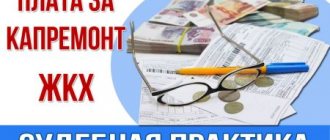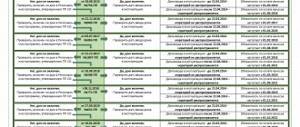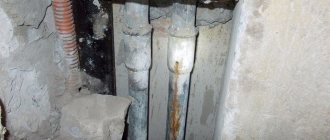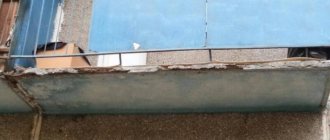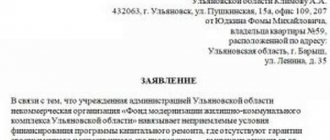Methods for checking debt
Often, tenants or even new apartment owners discover that there is a debt for major repairs at their address. Often, along with this debt, there are other types of debt - for housing and communal services, garbage removal, etc.
New owners or tenants, of course, do not expect to see a large amount owed. However, often the previous owners leave behind an extremely unpleasant “tail” in the form of an extra several tens of thousands of rubles of debt.
And it would be nice if the previous residents at least left receipts. But in most cases they are simply not found anywhere - neither in the house itself, nor in the mailbox.
There are several ways to find out your debt online:
- You can view your account status through the State Services service;
- On the website of your Unified Settlement Center, which is responsible for servicing your home;
- Through a personal appeal to the Capital Repair Fund or the Homeowners Association.
In all of the above cases, searching for your home is possible by address, personal account or by an already generated receipt. Let's take a closer look at how to find out the status of your account depending on the method.
Through State Services
The convenience of this method is that the entire procedure is done online - you will not need to go anywhere, collect documents, etc. It is enough to have a registered account in the State Services system, access to the Internet and the address of your home. So, how can you find out the debt for major repairs at an address? Follow our instructions:
- Go to the State Services website at https://www.gosuslugi.ru
- If you do not have your own account, you will need to register on the resource. To do this, click on the “Personal Account” button in the upper right corner, then click on the “Registration” button. You will need to enter your passport and contact information. Next, an SMS message with a verification code will be sent to your specified mobile number. Confirm ownership of the number, after which registration will be completed;
- Next, click on the “Service Catalog” button at the top of the site. Find the section “Payment for housing and communal services” ( https://www.gosuslugi.ru/10373/1 ). Click “Get a service”, enter your address, after which the system will automatically display the status of your account: existing debts, accrual dates, division of payments into categories, etc. In addition, right here you can pay off your debt by paying with a bank card, e-wallet or other way.
Thus, you only need a personal account on the State Services website. In this case, your personal account number will not even be needed - you only need the address of the apartment or house.
On the website of your URC or HOA
The method is very similar to checking your balance through State Services - everything is done via the Internet in a couple of clicks. In addition, checking the balance through the website of the service organization well answers the question “how to find out the debt for major repairs on a personal account”, because in this case, to check the debt you will not need anything other than a personal account.
The algorithm of actions is as follows. First, you need to find out which company is doing the major renovation of your home. To obtain this information, you can contact the Capital Repair Fund.
Next, go to the website of your URC or HOA. You will first need to go through the registration procedure - as a rule, they only require an email, a password for a new account and a personal account number. You will receive an email with a link inside - you need to follow it to confirm. After confirming your email, you can already track the status of your balance.
The design and functionality of the site directly depends on the URC or HOA, so it is impossible to give universal instructions. Try to find the section “Balance”, “Amount to be paid”, “Pay for major repairs”, etc. As a rule, this is where information is located for the user about the amount of debt and the date of its occurrence.
In person at the FKR or HOA
Unlike all previous methods, personal application requires time and a small package of documents, without which the center employees will refuse to provide information. You need to take with you:
- Certificate of registration of ownership or other document confirming your right to housing;
- Internal passport of the Russian Federation. It is especially good if it has a stamp indicating permanent registration at the address about which you want to receive information.
The addresses of the FKR or HOA can be found using online maps like Google Maps or Yandex Maps. Only the person who is registered in the housing space on a temporary or permanent basis, as well as the owners of this housing (even if there are many owners, and each has only a small share of the housing) can apply to the FKR or HOA.
FKR or HOA employees are required to provide you with all the necessary information on the day of your application. In practice, the client is informed about the status of his personal account immediately after checking the documents, i.e. The entire operation takes no more than 20 minutes.
Attention: the seller is obliged to give the buyer, upon purchase and sale, an original certificate of absence of debt on utility bills, because otherwise, if there are still debts for major repairs and housing and communal services, the new owner of the property will have to resolve the issue independently. Perhaps even through litigation, which is confirmed by extensive judicial practice in resolving housing disputes. Therefore, when buying an apartment, be sure to ask the seller for the appropriate certificate.
In what cases is the owner exempt from contributions?
The conditions for exemption from the obligation to pay contributions for major repairs are regulated by the Housing Code of the Russian Federation. In particular, according to the provisions of the Housing Code of the Russian Federation, the owner does not have to pay in the following cases:
- If an apartment building, part of which the owner owns, is recognized as unsafe . A conclusion on its emergency status must be issued in writing by the municipal administration of your city;
- If the property of the owner of real estate is temporarily seized from him for the needs of municipal or federal authorities. This means that during the “alienation” of the property, its current owner is completely exempt from all types of contributions, including housing and communal services, contributions for major repairs, etc. As a rule, real estate is confiscated in the event of unforeseen situations - the resettlement of refugees in your region, an increase in tourists due to any events, etc. It should be noted that the authorities most often do not touch ordinary “private traders”. This clause of the RF Housing Code applies, first of all, to hotels, hostels, property of developers, etc.;
- If the owner bought a recently commissioned house (the so-called “new building”). In this case, he is exempt from contributions for a period of one to three years, depending on the laws and regulations of his region. This information needs to be clarified with the city or regional administration. Also, the developers from whom the property was purchased are required to provide information on benefits.
How can you increase contributions for major repairs?
Sometimes owners are interested in increasing the monthly payment amount in order to carry out some additional work. For example, at the house council it was decided to install cast marble window sills in the entrance. This decision does not fit into the standards of the regional capital repair program, so this problem can be solved through increased contributions. To determine the new rate, property owners need to organize and hold a general meeting, at which voting will take place and a decision will be made. Next, it must be documented and sent to the Capital Repair Fund of your region. This scheme is used if funds for major repairs are stored in the reoperator’s account.
If the home owners’ funds are accumulated in a special account, then the amount of the contribution is set by the owners themselves from the very beginning (but not less than the minimum amount).
What are the consequences of failure to pay capital repairs?
In accordance with Art. 159 of the Housing Code of the Russian Federation, parts 14.1, the owner of the property is obliged to pay for major repairs. The debt is assigned to the owner of the property, and it cannot be written off unless there are other circumstances. In case of non-payment the following consequences occur:
- Penalty that “drips” from the 31st day of delay in payments. It is expressed as a percentage of 1/300 of the refinancing rate of the Central Bank of Russia on the total amount of debt. A penalty is charged for each month of delay. For a more complete understanding, let’s make a calculation using the formula: if the owner’s total debt for major repairs is 40,000 rubles, then he will be charged 341 rubles monthly in the form of a penalty;
- After six months from the date of the last payment, the HOA or municipal administration has the right to initiate legal proceedings, as a result of which bailiffs can collect part of the property against the debt;
- If, as a result of the trial, it is determined that the defendant did knowingly fail to fulfill his obligations, he will be required not only to repay the entire debt, but also to pay legal costs.
Limitation period for debt for major repairs
No separate legal acts were issued for the limitation period for debts for major repairs, and not a single paragraph of the RF Housing Code or the RF Civil Code was devoted to this aspect. This means that in the case of debts for major repairs, the homeowner must be guided by clause 1 of Art. 196 of the Civil Code of the Russian Federation, according to the provisions of which the statute of limitations is three years from the date of debt formation .
How can a management company avoid mistakes when sending information about a special account to the State Housing Registration Authority?
Managing organizations, being the owners of special accounts opened for the formation of a capital repair fund, are required to provide information about the special account to the State Housing Property Authority body, taking into account the fact that:
- The frequency of sending data is set differently for each region: monthly, quarterly, annual;
- the form and procedure for providing data is approved by the regulations of the constituent entity of the Russian Federation.
When preparing the report, the MA should check:
- the relevance of the template and data used, the timeliness of providing information in accordance with the legal acts of the constituent entity of the Russian Federation;
- coincidence of data on the owner, house and special account in the report with information in the register of special accounts of the constituent entity of the Russian Federation;
- correctness of the reporting period;
- completeness of data in accordance with reports for previous periods;
- absence of contradictions between different data.
For failure to provide the information specified in Part 3 of Art. 172 of the Housing Code of the Russian Federation, within the prescribed period, provision in an incomplete amount or in a distorted form, the owner of a special account may be brought to administrative liability under Art. 19.7 Code of Administrative Offenses of the Russian Federation.
Such a violation is punishable by a fine of 3,000–5,000 rubles for legal entities, and from 300 to 500 rubles for officials.
Is the debt for major repairs transferred to the new owner?
Unfortunately, the debt is transferred from the previous owner to the new owner of the property. This legal norm is enshrined in Article 158, Part 3 of the Housing Code of the Russian Federation. The confusion arises because, according to Art. 210 of the Civil Code of the Russian Federation, debts for utility bills are assigned to the citizen during whose period of ownership these debts appeared in the first place. However, Art. 158 part 3 of the Housing Code of the Russian Federation separates the concept of “contributions for major repairs”, therefore Art. 210 Civil Code of the Russian Federation.
Accordingly, there is no point in turning to law enforcement agencies and the courts - according to the law, it is you who are obliged to repay the debt. Therefore, we recommend that you always carefully read the purchase and sale agreement (it should reflect the status of your personal account), and also require a document from the seller confirming the absence of debt. Otherwise, in the absence of caution and attention, the buyer will only find himself an additional headache.
